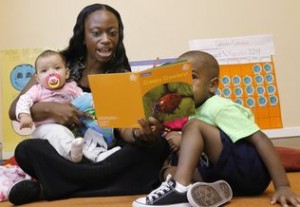Let’s face it – reading affects every area of our lives. If kids struggle with reading, it is highly likely they will struggle in other areas of their academic life too. Parents can influence kids to form better reading habits and help them become better readers. Check out these five tips to inspire your kids to love reading:
1. Read with your kids. Parent involvement is the number one predictor of early childhood reading success and future academic achievement. Kids learn from parental modeling. Starting a daily reading ritual for pre-kindergarten kids is vital for developing a child’s love for reading. Kids who own 100 or more books tend to be more ready to tackle academic challenges.
Using books with pop outs help stimulate imagination and make reading fun. Before getting started, read the title and ask your child to make a prediction of what the story is about. Point to words and pictures as you read to helps kids make the correlation between the story and the illustrations. Read with enthusiasm and energy by changing pitch and intonation to punctuate the story and character’s voice. Follow up each story by asking questions to ensure they understood the story and can relate it to another story or personal experience. The love of reading is partially developed by relating stories to real life.
2. Set technology limits. Set a predetermined amount of time for kids to plug in to technology (including TV) each day. Replace TV and gaming time with daily reading rituals by scheduling reading time for your kids each day. Reading on an e-reader is good, but be sure kids have an appreciation for traditional books too. Shared reading time with the family as well as individual reading time reinforces good reading habits. Reading with good comprehension sets kids up for success in all of their other subjects like social studies, math and science.
3. Help kids create a reading list. It’s important to keep your child’s reading level in mind when helping him choose a good book to read. Use your intuition when asking him questions about what he wants to learn about, who he’d like to meet or what he wants to be when he grows up. All of these things make a good list of things to read about.
For infants and toddlers, choose books with bright colorful pictures and familiar objects. Cardboard or washable fabrics prevent little hands from getting too excited and ripping pages. Books that appeal to their senses and explore different textures will be fast favorites. Poems and rhymes are fun for parents to recite over and over again.
Preschoolers love illustrations that are colorful and engaging. Short stories that have simple plots and actions to follow will hold their short attention spans. Stories that are about everyday life can help them explore their world and stories about how things work will help them learn new concepts. Characters that are about the same as age as your child will help him relate to the character and take an interest in the story line.
Choosing books for young readers, up to age 11, take on a new dimension. They enjoy stories that take several days to read. They also like to read more in-depth versions of their childhood favorites. They still enjoy illustrations and photos, especially in how-to books. By this time, your child may have developed favorite authors, so reading other books in a series by the same author is a good strategy.
Adolescents like to read books with characters that are facing similar teen related challenges in their lives. Novels that take them to faraway places and times can foster their love for science fiction or history. Biographies, folktales and mythology can be good options too.
4. Set content guidelines. It is totally fitting for parents to monitor what their kids read. Just like television and movies, it is reasonable to consider that parents wouldn’t want their kids to engage in books with vulgar language, sex, violence or drugs. It is also important to only allow kids to read material that is age appropriate.
5. Screen for learning disabilities like dyslexia. Kids who don’t like to read typically don’t have good reading skills. This could be because reading wasn’t part of their early childhood experience, therefore, they don’t appreciate the value reading could have in their lives. It is important for parents to delve deeper into the reasons their kids don’t like to read.
If kids find reading boring, it could be that they only read school assignments that don’t tap into their interests. Finding books that are more in alignment with their hobbies or interest might help them enjoy reading more.
Some kids find reading difficult or tedious. That is could be related to how they learned to read. Check in with his teacher and see if there are learning disabilities like dyslexia involved or if a tutor could help get them up to speed. Poor reading skills can lead to kids falling behind in school at not liking school.
Kids like to know that things are relevant to their lives and some kids haven’t made the correlation between books and real life. Finding books that tie into their hobbies, interests or aspirations can help improve their interest in reading.
Reading opens up new worlds for kids. Stories can take their imaginations to foreign lands and spark an interest in travel, culture and adventure. Reading biographies can provide positive role models and inspire kids to excel in sports, academics and service. Give your kids the gift of reading by making it fun and exciting.
